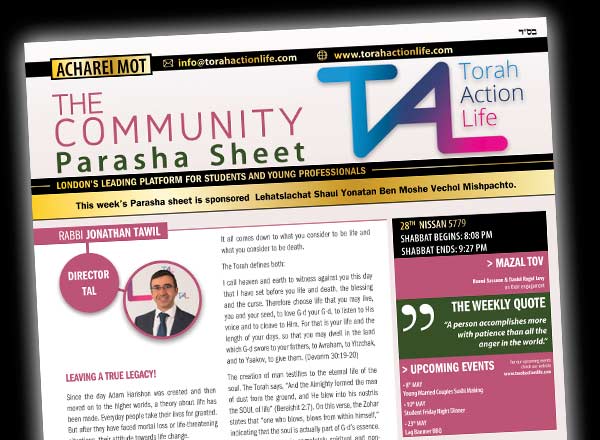
The Gemara Menachot (43b) brings a famous saying of Rabbi Meir who states: “It is obligatory for every person to say 100 blessings (Berachot) each day.”
The source for this 100 Berachot is derived from a Pasuk in Devarim (10:12) “And now, Israel what (”mah”) does Hashem require of you, but to fear Hashem your God, to walk in His ways, and to love Him, and to serve Hashem your God with all your heart and with all your soul”.
The words used in the above Pasuk “mah” – “what” is explained by the Gemara to also be read as “meah” – one hundred. Thus our Sages understood that the Pasuk was alluding to the requirement to say 100 blessings a day. (Reading the Pasuk as if to say: “And now Israel 100 blessings are what are required of you.”)
It is interesting to also note that this Pasuk has 100 letters hinting to this very fact.
The Shulchan Aruch (OH 46.3) and the Rambam (Sefer Ahavah 7) both rule that we must say 100 blessings a day.
The concept and enactment of the 100 Berachot preceded the Gemara to the times of King David. During this period a great plague ensued where 100 people were dying every day. King David tried to discern the cause of this plague and, with divine inspiration, enacted 100 Berachot to counter the 100 deaths. Once implemented, the deaths ceased.
The Hatam Sofer gives an interesting insight into the battle between Yaakov and Eisav’s angel in Parashat Vayishlach.
Yaakov Avinu wrestled with the angel of Eisav; it was a tough battle and the Torah records how the angel dislocated Yaakov’s thigh “bkaf yerecho”. The angel aimed specifically for this point in Yaakov’s body as this point symbolised future descendants. His aim was to weaken the future generations of Yaakov.
Yaakov Avinu understood that great calamities would befall Klal Yisrael. In order to counter these curses Yaakov Avinu managed to overcome the angel and demanded a blessing whereby the angel changed his name from Yaakov to Yisrael.
The Hatam Sofer explains that the character trait of Yaakov Avinu was Emet/absolute truth. The angel of Eisav wanted to take away the connection of Yaakov with Hashem; to take away the Aleph representing the One G-d. Without the Aleph in Emet – we are left with Met – death. Yaakov responded with strength. His name was changed to Yisrael. If you take the Gematria of Emet – 441 and add the 100 daily Berachot – we get 541 – the exact same Gematria as Yisrael.
The way we are able to cling to Yaakov’s character trait of Emet is to add the one hundred daily blessings. When we say these blessings we reinforce our allegiance and servitude to G-d. We become Yisrael of whom even angels are in awe of!
The great virtue of saying 100 Berachot is found in each Beracha we say. When we recite the Beracha we mention “Elokeinu Melech Haolam”. Looking closely at the first letters we note that they spell MEAH-100.
Blessings are said with our mouths – in Hebrew – Peh.
The word PEH is spelled with the letters Pey and Hey. The letter Pey is spelled as Pey and Hey numerically equalling 85. And the letter Hey is spelled Hey and Yud equalling 15. Together they amount to a total of 100.
The Megaleh Amukot mentions in Tehillim (100) – “Mizmor Letodah – a psalm of thanksgiving”, the Pasuk says “Hodu lo barechu shemo – give thanks unto him, and bless His name” from here we have a duty to praise, exalt and thank Hashem every day.
Furthermore in Tehillim (128:4) the Pasuk says ” Hine ki ken yevorach gaver yireh Hashem – Indeed, so shall the man who fears Hashem be blessed”. The words ki ken numerically corresponds to 100, moreover don’t read “yevorach – he shall be blessed but “yevarech” – he shall bless. The Pasuk can be interpreted as the one who recites 100 blessings is considered a G-d fearing person.
The Da’at Zekenim says the Beracha in the Amida called Modim/ thanksgiving which we recite three times daily, is one of most significant points of the Amida. We thank G-d for all the kindness He has performed for us.
Hazal say if one didn’t have concentration for the first Beracha of the Avot which is the primary focal point, then Modim with concentration compensates for it. Modim has numerical has a value of 100, we bow down to express a tremendous thank you to Hashem for the 100 gifts he bestows on us every moment.
The Ba’al Haturim illustrates this point of 100 Berachot in Parashat Pekudei. There, the Torah details the construction of the Mishkan with all its intricacies, vessels, curtains and tapestries. The foundation to the entire Mishkan were the Adanim – sockets into which the wooden beams holding up the structure of the Mishkan were placed.
The Ba’al Haturim explains that in total there were 100 Adanim.
Just as the foundation of the Mishkan was 100 Adanim, so too the 100 Berachot are the foundation of our inner Mishkan, and if we wishHashem to dwell within us, it is optimal to recite each Beracha with great kavvanah.
The purpose of 100 Berachot is to gain Yir’at Shamayim- fear of Heaven.
Rabbi Miller Z’L used to expound that the root word of Yir’ah- fear is Re’iyah- to see. How does a person see Hashem? Through the recitation of 100 Berachot!
Have you seen Hashem lately?
In loving memory of Reuben Ben Salem Yossef







